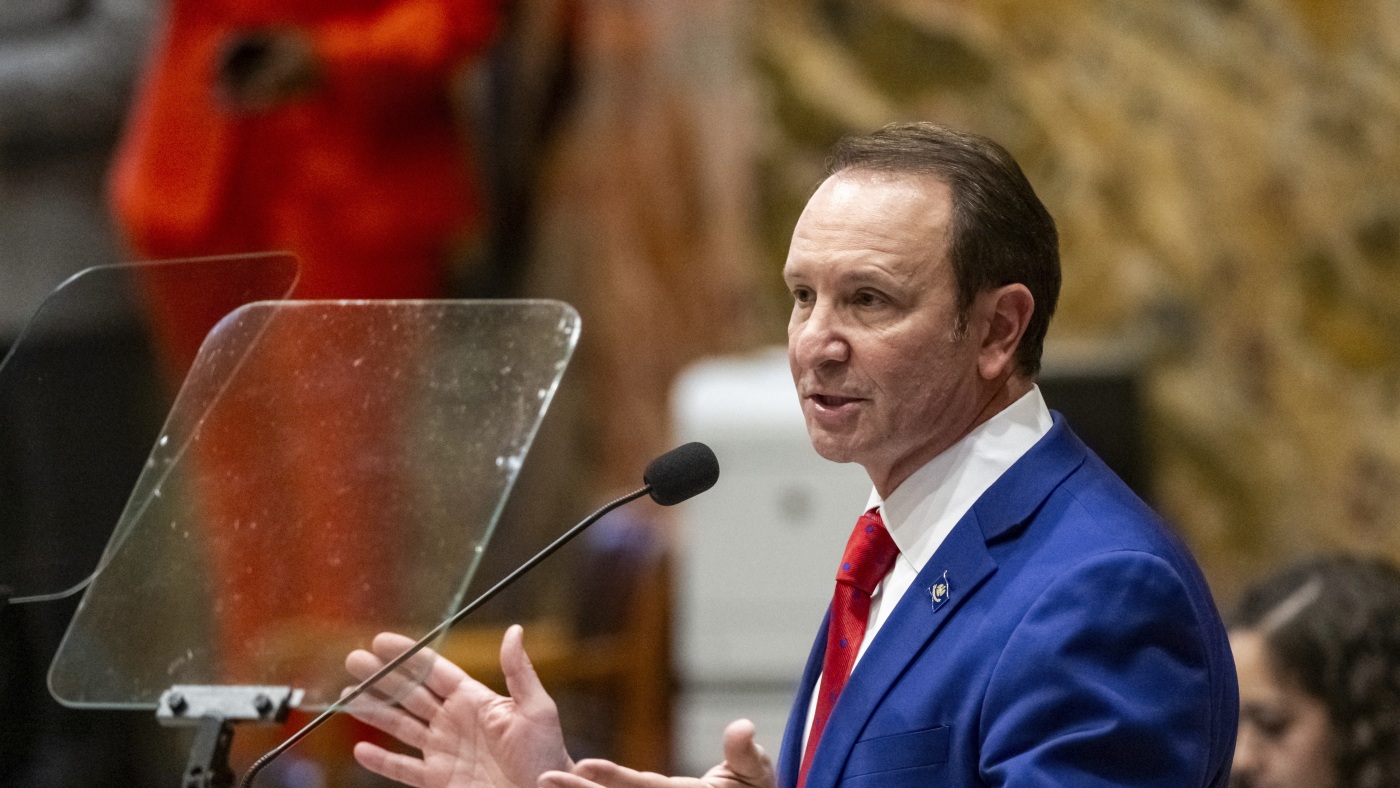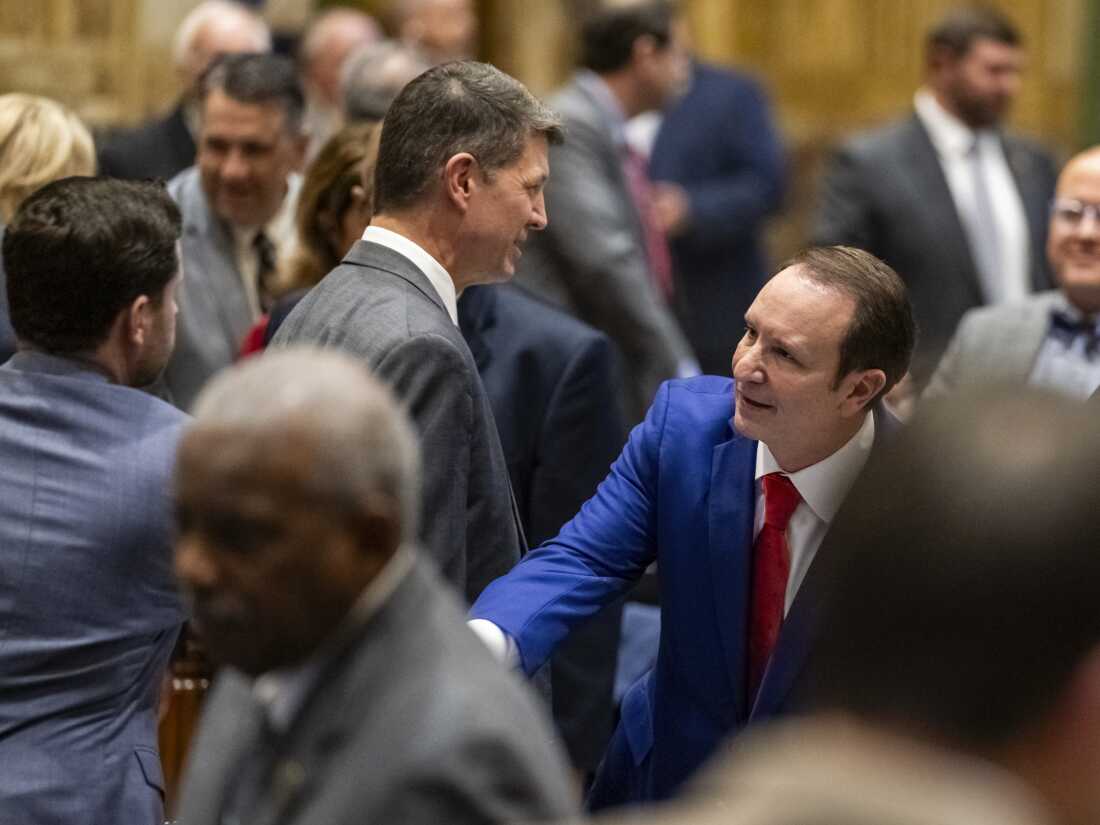News
What to know about Louisiana's new surgical castration law

Louisiana Gov. Jeff Landry speaks during the start of a special session in Baton Rouge, La., on Jan. 15, 2024. Landry signed a bill in June allowing surgical castration to be a potential punishment for certain sex offenses against children.
Michael Johnson/The Advocate/AP
hide caption
toggle caption
Michael Johnson/The Advocate/AP
Louisiana is now the first state to allow surgical castration to be used as a punishment for sex crimes under a new law signed by Republican Gov. Jeff Landry. This law, which will go into effect Aug. 1, allows judges to order people found guilty of certain sex crimes against minors to undergo surgical castration.
The use of surgical castration as punishment, which is a permanent procedure that involves the surgical removal of the testicles or ovaries ostensibly to stop the production of sex hormones, is rare elsewhere around the world. The Czech Republic, Madagascar and a state in Nigeria have such laws on the books that have been strongly criticized by Amnesty International and other human rights organizations.
Several U.S. states, including Louisiana, as well as other countries have laws allowing for the use of chemical castration — a procedure that uses pharmaceutical drugs to quell the offenders’ sex drive — for certain sex crimes.
The passage of this bill in Louisiana has grabbed headlines and caused ripples of consternation among criminal defense lawyers, advocates and medical experts, raising serious concerns around the ethics and constitutionality of the law and questions over whether this punishment would actually make a difference in reducing sex crimes.
“It’s very confusing, in addition to being absolutely unprecedented, and draconian and overkill,” said Gwyneth O’Neill, a New Orleans-based criminal defense attorney and a member of National Association of Criminal Defense Lawyers.
One of the drafters of the bill, Democratic state Rep. Delisha Boyd, told NPR the law will be a strong deterrent for would-be child sex abusers and would protect children.
So, what does the law say?
The law, as written, targets offenders found guilty of aggravated sex crimes, including rape, incest or molestation against a child under 13. The punishment would be brought in certain cases and at a judge’s discretion and the surgery would be completed by a physician. It will also require a court-appointed medical expert to determine whether the offender is the right candidate for the surgery.
An offender could refuse to get the surgery, but would then be sentenced to three to five years of an additional prison sentence without the possibility of getting out early.
The law doesn’t allow anyone under 17 found guilty of certain aggravated sex crimes to receive the punishment.
Boyd says she was inspired to propose this bill after seeing a disturbing article from a local newspaper about a 51-year-old man who was arrested for the alleged rape of a 12 year old. The story revealed that the man was a registered sex offender. In 2007 he had been arrested for allegedly raping a 5 year old.

Louisiana Democratic state Rep. Delisha Boyd works at her desk at her office on May 3, 2024, in New Orleans. Boyd introduced the bill, now law, that would allow for surgical castration to be used against individuals convicted of certain sex crimes.
Stephen Smith/AP/AP
hide caption
toggle caption
Stephen Smith/AP/AP
Boyd said that she believes the criticism she’s received from opponents of the law is from people who haven’t closely read the law and think it forces a prisoner to undergo this procedure.
“Some of the critics say, you know, that’s cruel and unusual punishment. Well, I disagree. I think the cruel and usual punishment was the rape of that 5 year old,” Boyd said.
The reasons why people commit sex offenses are so much more complicated than something that can be fixed with castration, said Maaike Helmus, an associate professor of School of Criminology at Simon Fraser University in Vancouver.
Helmus’ research focuses on offender risk assessment and on men who have committed sexual offenses or intimate partner violence.
“In our minds, it’s easy to link castration to the problem that they’re exhibiting and think that’ll fix it, but it’s taking a lot of leaps and logic that are not warranted, and not considering other alternatives,” like the use of medication, she said.
This law is part of the state’s ‘tough on crime’ efforts
In February, the state legislature held a special session on crime and passed several bills that Landry and lawmakers said would bring justice to crime victims and their families, according to Baton Rouge Public Radio.
The member station reported that the series of tough-on-crime bills passed the session “will likely reshape the landscape of criminal punishment in Louisiana for years to come.”
The bills expanded death penalty methods, effectively eliminated parole for anyone convicted after Aug. 1, lowered the amount of “good time credit” with few exceptions and established harsher penalties for some crimes.

Gov. Jeff Landry shakes hands with representatives while entering the House chamber during the first day of a special session on Monday, Jan. 15, 2024, in Baton Rouge, La.
Michael Johnson/The Advocate/Pool/AP
hide caption
toggle caption
Michael Johnson/The Advocate/Pool/AP
There are concerns over discriminatory application of the law
If it is challenged, O’Neill, the New Orleans-based criminal defense attorney, said it’s highly likely the law would be deemed unconstitutional under the Eighth Amendment’s prohibition of cruel and unusual punishment.
“Surgical castration is generally considered, or was considered, to be sort of like the paradigmatic example of cruel and unusual punishment, because it’s a form of physical mutilation. It’s barbaric,” she said.
Once it’s enacted later this summer, O’Neill fears the law could be applied in a discriminatory way — the same way the death penalty and other criminal justice policies tend to be, she said.
There is research that indicates the U.S. criminal justice system is applied unfairly to people of color, especially Black Americans. Research shows the number of imprisoned Black Americans has decreased 39% since its peak in 2002, according to The Sentencing Project, but remains higher for Black Americans generally. And in Louisiana, along with Arkansas, Mississippi and Oklahoma, the imprisonment rates are nearly 50% above the national average, according to the organization.
O’Neill says the law also uses vague and potentially confusing terms.
The law’s language mandates that a “court appointed medical expert” can decide if a person found guilty of a sex offense should undergo surgical castration. “We don’t know who that is, who’s going to qualify to be a medical expert,” O’Neill said. “There’s no guidance about that.”
And that introduces risks for defendants, she said.
“I think anytime you have this vague terminology, you’re not going to get the most qualified people to make such a determination,” O’Neill said. The law also doesn’t establish the criteria to evaluate whether an offender is an appropriate candidate for this punishment, she said.
“Practically speaking, I think it puts defense attorneys in a very difficult position,” she said.

Vehicles enter at the main security gate at the Louisiana State Penitentiary, the largest high-security prison in the U.S. in Angola, La., in August 2008.
Judi Bottoni/AP/FR37918 AP
hide caption
toggle caption
Judi Bottoni/AP/FR37918 AP
Could this law impact repeat offenses?
Part of the motivation behind this law was to cut down on the possibility of someone reoffending. But the research on sexual offense recidivism rates is tough to parse. The research on surgical castration and its effect has only been done on people who have voluntarily undergone the procedure out of concern they will harm again, Helmus said.
That impacts the analysis because these are individuals who are already working to not reoffend, she said.
“If you combine different studies, over multiple countries and jurisdictions and different types of settings, five-year sexual recidivism rates are generally expected to be in the range of five to 10%. And lifetime rates are maybe around 15 to 20%,” Helmus said.
But that’s only for cases the public knows about.
“We know that not all sex offenses get reported to police for a variety of reasons. And so we know that sexual recidivism rates are to some degree an underestimate, because not everything comes to the attention of police. However, it’s hard to know how much that’s actually going to affect reoffending rates,” she said.
Ultimately there’s very limited research on the effectiveness of any type of castration with people who’ve committed sex offenses, Helmus said.
“The whole point of castration is that it is supposed to reduce the sex drive. If you’re pursuing castration to reduce sexual offense rates, you’re making an assumption that they’re committing a sex offense because of a high sex drive or high testosterone rates in the first place,” but this is not always the motivation for committing these offenses, Helmus said.
Research indicates that there’s no evidence that people who commit sex offenses have higher testosterone in the first place.
“If that’s not the reason why they’re committing sex offenses, then reducing their testosterone is going to do nothing to reduce that risk,” she said.
Surgical castration also doesn’t mean someone cannot be sexually aroused or, in the case of men, get an erection or ejaculate, Helmus said. Not to mention there is still psychological arousal and urges that are not addressed with this procedure.
“Even if castrated, they can later take medications to reduce or reverse the effects of castration and still be able to increase their sex drive,” she said. “So castration isn’t a foolproof way of getting rid of their sex drive. What we know, especially for people who commit sex offenses against children, they don’t need an erection to be able to commit many of the types of sex offenses that they commit.”
Boyd still believes that this law could serve as a strong deterrent.
“These predators have to be stopped,” she said. “Even if just one rapist changes his mind about raping a child, I will take that.”

News
Anthropic CEO says he’s sticking to AI “red lines” despite clash with Pentagon

Hours after a bitter feud between the Pentagon and Anthropic ended with the Trump administration cutting off the artificial intelligence startup, Anthropic CEO Dario Amodei told CBS News in an exclusive interview Friday night he wants to work with the military — but only if it addresses the firm’s concerns.
“We are still interested in working with them as long as it is in line with our red lines,” he said.
The conflict centers on Anthropic’s push for guardrails that explicitly prevent the military from using its powerful Claude AI model to conduct mass surveillance on Americans or to power autonomous weapons. The Pentagon wants the ability to use Claude for “all lawful purposes,” and says it isn’t interested in either of the uses that Anthropic was concerned about.
The military gave Anthropic a Friday evening deadline to either meet its demands or get cut off from its lucrative Defense Department contracts. With the two sides still seemingly still far apart, President Trump on Friday ordered federal agencies to “immediately” stop using Anthropic’s technology. Then, Defense Secretary Pete Hegseth declared the company a “supply chain risk,” directing military contractors to also stop working with the AI startup.
In his interview later Friday, Amodei stood by the guardrails sought by Anthropic, which is the only company whose AI model is deployed on the Pentagon’s classified networks.
“Our position is clear. We have these two red lines. We’ve had them from day one. We are still advocating for those red lines. We’re not going to move on those red lines,” Amodei later said. “If we can get to the point with the department where we can see things the same way, then perhaps there could be an agreement. For our part and for the sake of U.S. national security, we continue to want to make this work.”
Amodei told CBS News that Anthropic has sought to deploy its AI models for military use because “we are patriotic Americans” and “we believe in this country.” But the company is worried that some potential uses of AI could clash with American values, he said.
Mass surveillance is a risk, Amodei argued, because “things may become possible with AI that weren’t possible before,” and the technology’s potential is “getting ahead of the law.” He warned that the government could buy data from private firms and use AI to analyze it.
In theory, artificial intelligence could also be used to power fully autonomous weapons that select targets and carry out strikes without any human input. Amodei said his company isn’t categorically opposed to those kinds of weapons, especially if U.S. adversaries develop them, but “the reliability is not there yet” and “we need to have a conversation about oversight.”
The Free Press: Will AI Doom Us All? The Market Can’t Decide
Since AI technology is still unpredictable, Amodei is concerned that autonomous weapons could target the wrong people by mistake. And unlike with human-powered weaponry, it’s not clear who is responsible for the decisions made by fully autonomous weapons.
“We don’t want to sell something that we don’t think is reliable, and we don’t want to sell something that could get our own people killed or that could get innocent people killed,” he said.
Amodei called the guardrails around surveillance and autonomous weapons “narrow exceptions,” and said the company has no evidence that the military has run into either of them.
The Pentagon’s position is that federal law already prevents it from surveilling Americans en masse, and fully autonomous weapons are already restricted by internal military policies, so there is no need to put restrictions on those uses of AI in writing.
Emil Michael, the Pentagon’s chief technology officer, told CBS News in an interview Thursday: “At some level, you have to trust your military to do the right thing.”
“But we do have to be prepared for the future. We do have to be prepared for what China is doing,” Michael said, referring to how U.S. adversaries use AI. “So we’ll never say that we’re not going to be able to defend ourselves in writing to a company.”
As a compromise, Michael said the military had offered written acknowledgements of the federal laws and military policies that restrict mass surveillance and autonomous weapons — though Anthropic said that offer was “paired with legalese” that allowed the guardrails to be ignored.
As the conflict between Anthropic and the Pentagon escalated this week, top military officials accused the company and Amodei of trying to impose their values onto the government. Hegseth called Anthropic “sanctimonious” and arrogant, Michael said that Amodei has a “God-complex” and Mr. Trump called the AI startup a “radical left, woke company.”
“Their true objective is unmistakable: to seize veto power over the operational decisions of the United States military. That is unacceptable,” Hegseth alleged.
Said Mr. Trump: “Their selfishness is putting AMERICAN LIVES at risk, our Troops in danger, and our National Security in JEOPARDY.”
Asked if weighty questions about AI guardrails should be left up to Anthropic rather than the government, Amodei told CBS News that “one of the things about a free market and free enterprise is, different folks can provide different products under different principles.”
He also said: “I think we are a good judge of what our models can do reliably and what they cannot do reliably.”
In the long run, he said, Congress should probably weigh in on AI safeguards.
“But Congress is not the fastest moving body in the world. And for right now, we are the ones who see this technology on the front line,” said Amodei.
With Anthropic and the Pentagon unable to reach a deal by Friday, the military is now expected to phase out its use of Anthropic’s AI technology within six months and transition to what Hegseth called “a better and more patriotic service.”
Hegseth also labeled Anthropic a “supply chain risk” and said all companies that do business with the military are now expected to cut off “any commercial activity with Anthropic.”
Amodei called that an “unprecedented” move for an American firm rather than a foreign adversary, and he said the government’s statements have been “retaliatory and punitive.” And he argued that Hegseth doesn’t have the legal authority to bar all military contractors from working with Anthropic, and can only stop them from using Anthropic for government contracts.
He also said that Anthropic hasn’t formally received any information from the Pentagon informing it of a supply chain risk designation, but “when we receive some kind of formal action, we will look at it, we will understand it and we will challenge it in court.”
Asked if he has a message for the president, Amodei said “everything we have done has been for the sake of this country” and “for the sake of supporting U.S. national security.”
“Disagreeing with the government is the most American thing in the world,” he said. “And we are patriots. In everything we have done here, we have stood up for the values of this country.”
News
How the federal government is painting immigrants as criminals on social media

Getty Images, Dept. of Homeland Security and The White House via X/Collage by Emily Bogle/NPR
Two days after At Chandee, who goes by Ricky, was arrested by U.S. Immigration and Customs Enforcement, the White House’s X account posted about him, calling the 52-year-old the “WORST OF WORST” and a “CRIMINAL ILLEGAL ALIEN.”
Except that the photo the White House posted was of a different person. The post also incorrectly claimed Chandee had multiple felony convictions — he has one, for second-degree assault in 1993 when he was 18 years old. He shot two people in the legs and served three years in prison.

At “Ricky” Chandee with his wife, Tina Huynh-Chandee.
Via the Chandee family
hide caption
toggle caption
Via the Chandee family
Chandee, who came to the U.S. as a child refugee, was ordered to be deported back to his home country, Laos. But Laos had not been accepting all of the people the U.S. wanted it to, so the federal government determined that it was likely infeasible to deport him, his lawyer Linus Chan told NPR. Chandee therefore was granted permission to stay in the U.S. and work so long as he checked in with immigration authorities periodically. He has not missed a check-in in over 30 years and has not had another criminal incident.
People who know Chandee do not see him as “worst of the worst.”
After Chandee completed his prison sentence, he finished school and became an engineering technician. He worked for the City of Minneapolis for 26 years, became a father, and his son grew up to join the military.
In his free time, Chandee enjoys hiking and foraging for mushrooms, Minnesota Public Radio reported.
“We are proud to work alongside At ‘Ricky’ Chandee,” said Tim Sexton, Director of Public Works for the City of Minneapolis in a statement. “I don’t understand why he would be a target for removal now, why he was brutally detained and swiftly flown to Texas, or how his removal benefits our city or country.” Chandee is petitioning for his release in federal court.
Chandee’s case is not unique
Social media accounts from the White House, the Department of Homeland Security and other immigration agencies have spent much of the past year posting about people detained in the administration’s immigration crackdown, typically portraying them as hardened, violent criminals. That’s even as over 70% of the people detained don’t have criminal records according to ICE data.
NPR’s research of cases in Minnesota shows that while many of the people who have been highlighted on social media do have recent, serious criminal records, about a quarter are like Chandee, with decades-old convictions, minor offenses or only pending criminal proceedings. Scholars of immigration, media and criminal law say such a media campaign is unprecedented and paints a distorted picture of immigrants and crime.
A year into President Trump’s second term, the X accounts of DHS and ICE have posted about more than 2,000 people who were targets of mass deportation efforts. Starting late last March, DHS and ICE began posting on X on a near daily basis, often highlighting apprehensions of multiple people a day, an NPR review of government social media posts show.
Among the 2,000 people highlighted by the agencies, NPR identified 130 who were arrested by federal agents in Minnesota and tried to verify the government’s statements about their criminal histories.
In most of the social media posts, the government did not provide the state where the conviction occurred or the person’s age. Public court records do not tend to include photos so definitive identification can be a challenge.
NPR derived its findings from cases where it was able to locate a name and matching criminal history in the Minnesota court and detention system, in nationwide criminal history databases, sex offender databases, and in some cases, federal courts and other state courts.
In 19 of the 130 cases, roughly 1-in-7, public records show the most recent convictions were at least 20 years ago.
Seventeen of the 19 cases with old convictions did include violent crimes like homicide and first-degree sexual assault. ICE provided some of those names to Fox News as key examples of the agency’s accomplishments. “It’s the most disturbing list I’ve ever seen,” said Fox News reporter Bill Melugin on X, highlighting the criminal convictions of each person on the list.
For seven people, their only criminal history involved driving under the influence or disorderly conduct.

ICE agents approach a house before detaining two people in Minneapolis on Jan. 13.
Stephen Maturen/Getty Images
hide caption
toggle caption
Stephen Maturen/Getty Images
Six of the 130 Minnesota cases highlighted by the administration involved people with no criminal convictions. The government’s social media posts for those six instead rely upon the charges and arrests as evidence of their criminality, even though arrests don’t always lead to charges and charges can be dismissed.
In yet another case, the government highlighted a criminal charge even while noting it had been dismissed. (The person did have other existing convictions.)
For 37 of the 130 people, NPR was unable to confirm matching criminal history after consulting the databases and news coverage. Some of the names turned up no criminal history at all. The government said these people committed crimes ranging from homicide and assault to drug trafficking, and cited one by name to Fox News. NPR tried to reach out to all 37 people and their families for comment but did not receive a response from any.
In a statement to NPR, DHS’s chief spokesperson Lauren Bis did not dispute NPR’s findings or provide documentation where NPR wasn’t able to confirm matching criminal history.
“The fact that NPR is defending murderers and pedophiles is gross,” Bis wrote. “We hear far too much about criminals and not enough about their victims.” before listing four of the people with old convictions of homicide and sexual assault, underlining the date of deportation order for three of them.
Images designed to trigger emotion
The stream of social media posts with photos of mostly nonwhite people are meant to draw an emotional response, says Leo Chavez, an emeritus professor of anthropology at the University of California, Irvine. They “have been used repeatedly over and over to get people to buy into, really drastic, drastic and draconian actions and policies,” he said.
Chavez, whose most recent book is The Latino Threat: How Alarmist Rhetoric Misrepresents Immigrants, Citizens, and the Nation, recalls how political campaigns in past decades presented images of Latinos — often men — without context. “Just by showing their image, showing brown people, particularly brown men, it’s supposed to be scary.”
The fact that the government’s social media posts come with statements about criminal history as well as photos reinforces that emotional response, Chavez said. DHS has previously acknowledged inaccuracies on their website. But even if the department issues corrections, Chavez said, “the goal was actually achieved, which was to reinforce the criminality and the visualization.”
CNN’s analysis of DHS’s “Arrested: Worst of the Worst” website showed that for hundreds out of about 25,000 people posted on the website, the crimes listed were not violent felonies. Instead, DHS listed people with records that included traffic offenses, marijuana possession or illegal reentry. DHS said the website had a “glitch” that it will fix but also that the people in question “have [committed] additional crimes.”
“I’ve never seen anything like this when it comes to immigration enforcement in the modern era,” said Juliet Stumpf, a professor at Lewis & Clark Law School who studies the intersection of immigration and criminal law. She said the drumbeat of social media posts focused on specific individuals was like “FBI’s most wanted posters” or “like reality TV shows.”

Then-DHS Assistant Secretary for Public Affairs Tricia McLaughlin, flanked by deputy director of U.S. Immigration and Customs Enforcement Madison Sheahan (left), and Acting director of U.S. Immigration and Customs Enforcement Todd Lyons, speaks during a news conference at ICE Headquarters, in Washington, D.C., on May 21, 2025.
Jose Luis Magana/AP
hide caption
toggle caption
Jose Luis Magana/AP
Stumpf drew a parallel with an incident from the 1950s when the U.S. government deported two permanent residents suspected of being communists. “The government was kind of proclaiming and celebrating their deportation because getting rid of these communists was making the country safer,” said Stumpf, “Maybe that’s comparable to something like [this].”
An analysis by the Deportation Data Project shows a dramatic increase in arrests of noncitizens without criminal records during President Trump’s current term compared to President Biden’s term.
“If you look at research, immigrants actually tend to commit fewer crimes than even U.S. citizens do. And that’s true of immigrants who have lawful status here and immigrants who don’t,” said Stumpf. “If we have a number of social media posts that are painting immigrants as the worst of the worst…it’s actually really putting out a distorted version of reality about who immigrants actually are.”
Some claims are disputed by other authorities
In some posts, DHS and ICE have also used photos of people and statements about their criminal histories to burnish the federal government’s accomplishments, defend their agents and criticize states like Minnesota. State and local authorities have in turn pushed back, and some of the federal government’s claims about the people it has detained have been met with setbacks in the courts.
DHS accused Minnesota’s Cottonwood County of not honoring detainers, written requests by ICE to hold prisoners in custody for a period of time so ICE can pick them up. In one post, the agency identified a person who was charged with child sexual abuse, writing “This is who sanctuary city politicians and anti-ICE agitators are defending.”
The Cottonwood County sheriff’s office said DHS’s post “misrepresented the truth” in their own post on Facebook. According to their account, the county did honor the detainer but ICE said it was unable to pick up the person before the order expired and the county had to release the suspect.
The Minnesota Department of Corrections wrote in a blog post that dozens of people DHS listed on its “Worst of the Worst” website were not arrested as DHS described, but were transferred to ICE by the state because they were already in state custody. The Corrections Department has since launched a page dedicated to “correct the Department of Homeland Security’s (DHS) repeated false claims.”
The “Worst of the Worst” website has some overlap with the department’s social media posts, but it contains a much larger number of people — over 30,000 nationally. It included a Colombian soccer star who was extradited to the U.S., tried in Texas, convicted of drug trafficking and served time in federal prison. The website incorrectly describes him as being arrested in Wisconsin. The soccer player, Jhon Viáfara Mina, recently finished his sentence early and returned to Colombia, according to Spanish newspaper El Diario Vasco.
In some instances, DHS and ICE wrote about incidents where they ran into conflict when carrying out arrests. In those posts, they named the arrestees and posted their photos. But in one case where the incident went to court, the government’s account of the events shifted. After a federal agent shot Julio C. Sosa-Celis in Minneapolis in January, DHS claimed he was lodging a “violent attack on law enforcement.” Assault charges against Sosa-Celis fell apart in court as new evidence surfaced, and the officers involved were put on leave.
Despite the fact that the charges were dropped, DHS’s post profiling Sosa-Celis remains online.
News
Bill Clinton to testify before House committee investigating Epstein links

Former president Bill Clinton is scheduled to give deposition Friday to a congressional committee investigating his links to Jeffrey Epstein, one day after Hillary Clinton testified before the committee and called the proceedings “partisan political theatre” and “an insult to the American people”.
During remarks before the House oversight committee, Hillary Clinton, the former secretary of state, insisted on Thursday that she had never met Epstein.
The former Democratic president, however, flew on Epstein’s private jet several times in the early 2000s but said he never visited his island.
Clinton, who engaged in an extramarital affair while president and has been accused of sexual misconduct by three women, also appears in a photo from the recently released files, in a hot tub with Epstein and a woman whose identity is redacted.
Clinton has denied the sexual misconduct claims and was not charged with any crimes. He also has not been accused of any wrongdoing connected to Epstein.
Epstein visited the White House at least 17 times during the early years of Clinton’s presidency, according to White House visitor records cited in news reports. Clinton said he cut ties with him around 2005, before the disgraced financier, who died from suicide in 2019, pleaded guilty to solicitation of a minor in Florida.
The House committee subpoenaed the Clintons in August. They initially refused to testify but agreed after Republicans threatened to hold them in contempt.
The Clintons asked for their depositions to be held publicly, with the former president stating that to do so behind closed doors would amount to a “kangaroo court”.
“Let’s stop the games + do this the right way: in a public hearing,” Clinton said on X earlier this month.
The committee’s chair, James Comer, did not grant their request, and the proceedings will be conducted behind closed doors with video to be released later.
On Thursday, Hillary Clinton’s proceedings were briefly halted after representative Lauren Boebert leaked an image of Clinton testifying.
During the full day deposition, Clinton said she had no information about Epstein and did not recall ever meeting him.
Before the deposition, Comer said it would be a long interview and that one with Bill Clinton would be “even longer”.
-

 World2 days ago
World2 days agoExclusive: DeepSeek withholds latest AI model from US chipmakers including Nvidia, sources say
-

 Massachusetts3 days ago
Massachusetts3 days agoMother and daughter injured in Taunton house explosion
-

 Montana1 week ago
Montana1 week ago2026 MHSA Montana Wrestling State Championship Brackets And Results – FloWrestling
-

 Louisiana5 days ago
Louisiana5 days agoWildfire near Gum Swamp Road in Livingston Parish now under control; more than 200 acres burned
-

 Denver, CO3 days ago
Denver, CO3 days ago10 acres charred, 5 injured in Thornton grass fire, evacuation orders lifted
-

 Technology1 week ago
Technology1 week agoYouTube TV billing scam emails are hitting inboxes
-

 Technology1 week ago
Technology1 week agoStellantis is in a crisis of its own making
-

 Politics1 week ago
Politics1 week agoOpenAI didn’t contact police despite employees flagging mass shooter’s concerning chatbot interactions: REPORT













